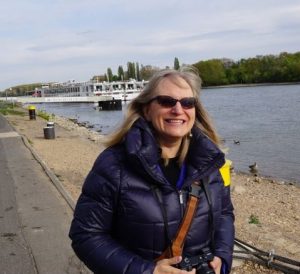Dec
05

Posted by nnlmneo on December 5th, 2017
Posted in: Blog

The NEO welcomes our new evaluation specialist, Susan M. Wolfe. Susan will be contributing her evaluation expertise to the National Library of Medicine’s recently announced partnership with the NIH All of Us Research Program. a landmark effort to advance precision medicine. The All of Us program aims to build one of the largest, most diverse datasets of its kind for health research, engaging with one million or more volunteers nationwide who will sign up to share their information over time. NLM and All of Us will work together to raise awareness about the program and improve participant access through community engagement efforts with public libraries across the United States. You can read more about the All of Us partnership here.
Susan is an evaluator and community psychologist who works with local, state, national, and international organizations through her consulting firm, Susan Wolfe and Associates. She formerly served as program analyst for the US Department of Health and Human Services Office of the Inspector General; director of a longitudinal homelessness research study funded by the National Institute of Mental Health; and assistant director of research for a large community college district. A teacher and writer, Susan has been an adjunct lecturer with several universities and published numerous peer-reviewed journal articles, book chapters, and books. She has a PhD in Human Development from the University of Texas at Dallas, an MA in Ecological (Community) Psychology from Michigan State University, a BS in Psychology from the University of Michigan-Flint, and a diploma from the Michigan School of Beauty Culture.
What exactly is a community psychologist?
Most disciplines within psychology are focused on individuals. Community psychologists go beyond the individual to look at the individual in interaction with the environment. Environment includes the social, cultural, economic, political, and physical environmental influences. We work to promote positive change, health, and empowerment at the individual and systemic levels.
How does being a community psychologist affect your evaluation work?
Community psychology provided me with a great foundation for evaluation work. My training included a lot of research and evaluation methods and ecological theories. These theories remind me about how interconnected everything is and that when you change something in the world, because of the interconnectedness, something else is likely to be affected. For example, when gentrification occurs in neighborhoods we often think of that as a good thing because it revitalizes the neighborhood and prevents further decline. However, on the other hand, many people are displaced as rents rise and they can no longer afford to live there, and some become homeless. When I evaluate a program, I automatically start looking at it within its context, including where it fits within a system, how it affects the system, and how the system affects the program. I also add a racial equity and social justice perspective to my work where it is applicable.
What is one of your favorite evaluation experiences?
I’ve had too many favorite experiences, so I will describe my most memorable. I was working for the U.S. Department of Health and Human services when Hurricane Katrina struck. One of the tragedies from the hurricane was the deaths in nursing homes, which prompted a request for an evaluation of nursing home emergency planning among the Gulf States. I was appointed as co-lead for the study, which had a very tight timeline. We incorporated a lot of context measures into the design. Team members did site visits to all the Gulf States. Data collection was interesting, but also emotionally taxing as we witnessed the devastation to the sites and the people who lived there – especially in Louisiana and Mississippi. We talked with nursing home directors, emergency managers, mayors, police chiefs, nursing home ombudsmen and many others and learned a lot about the complexity involved in making the decisions whether to evacuate or not, and then implementing the plans either way. There are risks if they stay, and other risks if they leave, so it isn’t simple.
What made that experience so special?
The report received a lot of attention and we were left with a feeling that we produced a report that could make a difference. Our team received the Inspector General’s Award for Excellence in Program Evaluation for it.
What attracted you to the All of Us Research Project?
I was excited at the prospect of being involved in a project of such significance for medical practice. For the past several years I have done a substantial amount of work with health disparities. The idea that so much data will be gathered to enable scientists to learn more about individual and group differences across multiple levels (biological, environmental, behavioral) will, hopefully, help to reduce and eliminate the disparities. How could I not be attracted to this!
What bit of personal information would you like to share to help us know you better?
I am really introverted, although most people don’t believe me when they meet me. I love working at home with just the company of my Chihuahua, Chiweenie, and cat. I like to travel a lot, all over the country and world. I crochet mediocre things for my family – like blankets and hats, and I like to hang out at home, cook, clean the kitchen, and watch TV. I am married to Charles, have two grown children, a daughter-in-law, two grandchildren, and another grandchild on the way.
Final note: Susan works remotely for the University of Washington Health Sciences Library from Cedar Hill, Texas, and can be reached at smwolfe@uw.edu.